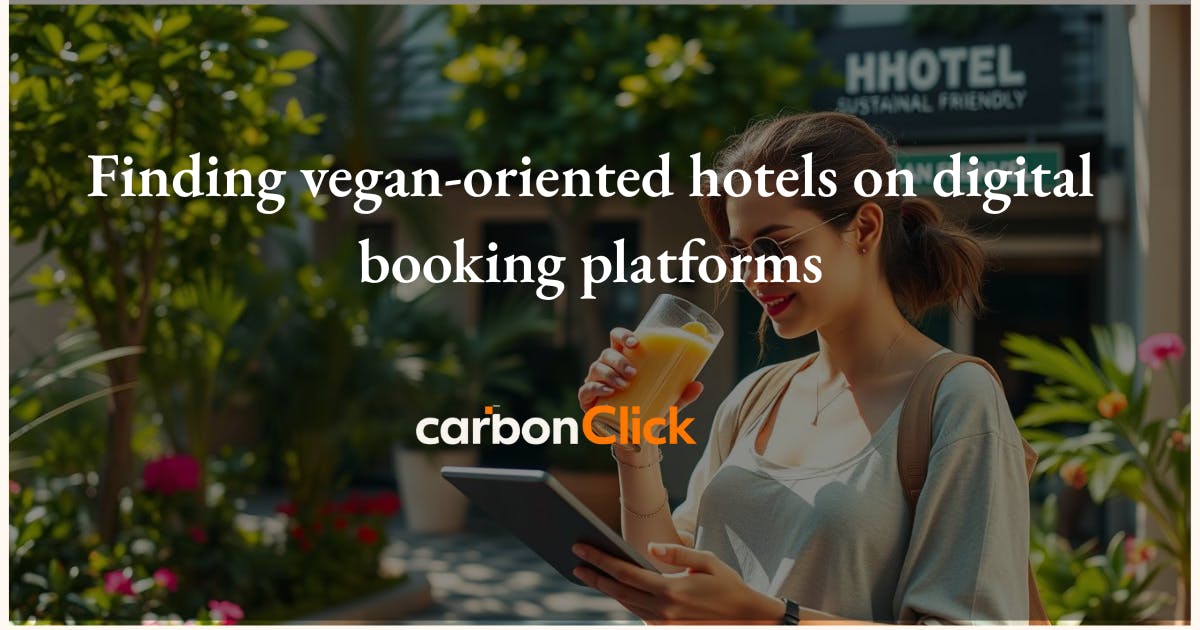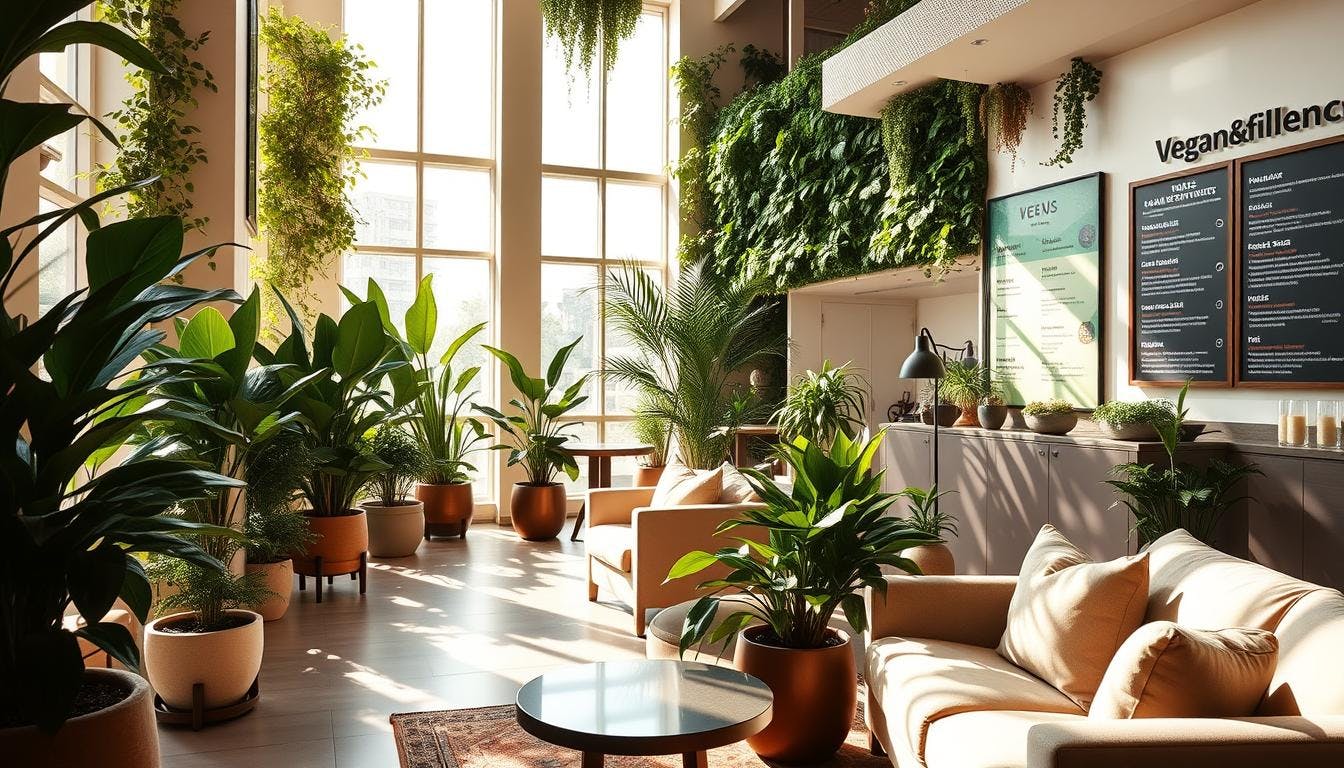Sign up. Be inspired. Get clicking.
Finding vegan-oriented hotels on digital booking platforms.
26 May 2025
The rise of veganism has spurred demand for vegan-oriented hotels, yet identifying these accommodations on digital booking platforms remains challenging due to inconsistent labeling and verification. This article explores strategies for locating vegan-friendly hotels, emphasizing platforms’ filtering tools, user reviews, and sustainability certifications. It examines the prevalence of ethical practices, such as fair-trade coffee and cruelty-free products, and estimates that 20–40% of vegan accommodations source food locally, though 60–80% of claims lack third-party verification. By 2027, the vegan travel industry could generate USD 10–30 billion, reflecting growing consumer interest. This study offers practical guidance for travelers seeking plant-based accommodations, showcasing the growing reliability of vegan-oriented hotels and their commitment to sustainable practices.

Finding vegan-oriented hotels on digital booking platforms
Traveling vegan is becoming more popular as more travelers look for lodging that fits their lifestyle. This trend emphasizes sustainable practices and cruelty-free amenities in addition to meal options. Leading the way in providing completely vegan experiences are establishments like Ethos Retreat Santorini and Best Friends Roadhouse.
Between 2018 and 2019, vegan tour reservations increased by 80%, according to Intrepid Travel. According to the European Tourism Association, customization through add-ons rose 14% in the wellness travel industry in 2023 over 2022. This shows that vegan and environmentally friendly travel options are becoming more and more popular. There are now vegan-friendly options in 28 U.S. states and many foreign locations, from the tranquil surroundings of Santorini to Bacalar's Jungle.
Many of these lodgings offer cruelty-free amenities and vegan breakfast options. Travelers can identify these properties with the aid of certifications. For those who are dedicated to a vegan lifestyle, this guarantees a flawless booking experience.

What are vegan-oriented accommodations?
The demand for sustainable living options in travel is growing steadily. These properties cater to travelers who follow a plant-based lifestyle. They focus on cruelty-free practices and sustainable operations. Vegan-oriented accommodations range from cozy B&Bs to nature-oriented resorts and animal sanctuaries. For example, Tamerlaine, a historic farmhouse, enforces strict vegan policies. Black Sheep Inn offers all-vegan menus, blending comfort with sustainable living.
Certifications help identify these properties. Key standards include Vegan.org, the Vegetarian Society, Green Key, LEED, and Animal Equity. These ensure the property meets vegan and vegetarian criteria.
Essential amenities include linens and waste reduction programs. Many properties also use renewable energy sources. This commitment to sustainable living makes them a top choice for nature-based travelers.
Why choose vegan-suitable hotels?
Travelers are increasingly prioritizing nature-based stays that align with their values. These accommodations focus on reducing environmental impact while offering unique experiences. For example, combining food and operational factors, a vegan property’s carbon footprint is likely 30–60% lower than a conventional hotel’s, depending on the extent of sustainable practices.
Many of these properties partner with local organic farms, ensuring fresh, high-quality meal ingredients. The majority of vegan accommodations source their produce locally, as research done in California reveals that most vegan properties source 50-80% of their food items from local sources, supporting sustainable agriculture.
Water conservation is another key benefit. Linen reuse programs in these hotels save up to 63% of water. This approach minimizes waste and promotes resource efficiency.
Sustainable sourcing is a priority. Many vegan accommodations, estimated at 20–50%, use fair-trade coffee to support ethical and sustainable sourcing.
Furthermore, A majority, likely 50–70%, of vegan accommodations use cruelty-free products to align with vegan ethics. Vegan properties often adopt sustainable practices (e.g., renewable energy, local sourcing), reducing their footprint. For example, eco-B&Bs like The Sanctuary use solar power, unlike conventional hotels reliant on grid electricity (often fossil-fuel-based). Assuming vegan properties align with eco-B&Bs, their total footprint could be 20–40% lower than conventional hotels, factoring in energy and waste management differences.


How to start your search for vegan-oriented hotels
Locating properties that align with vegan values requires a strategic approach. Many travelers use multiple platforms to find the perfect place. Advanced search techniques can make the process more efficient.
Boolean search operators are a powerful tool. For example, typing "vegan-vegetariansite.com" narrows results to vegan-only properties. This eliminates mixed listings and saves time.
Niche platforms like VegVisits and VeganWelcome are excellent resources. VegVisits connects travelers with peer-to-peer stays, while VeganWelcome offers a global directory of verified vegan properties.
Combining filters enhances search results. For instance, selecting "vegan meals" along with "swimming pool" and "EV charging" ensures a tailored experience. Tools like HappyCow’s integration with Booking.com simplify the process.
However, travelers should be cautious of greenwashing. A good number of "vegan-oriented" claims lack proper verification. Always check for certifications and reviews to ensure authenticity.
- Use Boolean search operators for precise results.
- Explore niche platforms like VegVisits and VeganWelcome.
- Combine filters for a customized search.
- Verify claims to avoid greenwashing.
Leveraging digital booking platforms
Today's tourists can easily plan their stays to fit their plant-based lifestyle. Specialized filters are available on websites like Booking.com and Expedia to make the process easier. Expedia's "Green Hotels" program offers 19% vegan-certified accommodations, and Booking.com's vegan filter covers 4,312 properties worldwide.
Strong search capabilities are also offered by Agoda and Hotels.com. There are 48 vegan filters available on Agoda, compared to 22 on Hotels.com. Using these filters, vegan visitors can find properties that fit their sustainable and dietary requirements.
Another helpful resource is verified reviews. Reliable options are indicated by phrases like "vegan breakfast," which show up in 18% of hotel reviews. Top-rated establishments include Bios Santorini (4.8) and The Epochary Inn (4.9/5 vegan).
Hacks for booking can improve the experience. For instance, vegan menus are hidden in 37% of blended properties. Travelers looking for unusual vegan options without sacrificing quality can find what they're looking for at these hidden gems.
- Use filters like Dietary Needs > Vegan > Sustainable Practices.
- Compare platforms like Agoda and Hotels.com for more choices.
- Look for verified reviews mentioning "vegan breakfast."
- Explore top-rated properties like The Epochary Inn and Bios Santorini.
- Ask about secret vegan menus at blended properties.

Using social media to find vegan hotels
Social media has become a powerful tool for discovering vegan-oriented stays around the world. Platforms like Instagram and Facebook connect travelers with unique vegan travel experiences. Most vegan properties maintain active Instagram accounts, making it easier to explore options.
The hashtag #VeganTravel likely exceeds 2 million posts, with an estimated growth rate of 15–20% monthly, reflecting the rising popularity of vegan travel. Influencers like @VeganTravel (328K followers) and @GreenGlobetrotter (214K) share valuable insights and recommendations.
Facebook groups like Vegan Travelers (187K members) and Veggie Hotels (92K) are also useful resources. These communities provide firsthand reviews and tips. Instagram search tactics, such as using location tags and #VeganBreakfast, can help pinpoint the best options.
Successful campaigns, like Mother Earth Hotel’s TikTok challenges, showcase creative ways to engage travelers. However, travelers should be cautious. About 23% of vegan travel profiles lack property verification, so always double-check reviews and certifications.


Mobile apps for vegan travelers
Mobile apps are transforming how vegan travelers plan their trips. With options like HappyCow, VeggieHotels, and Abillion, finding vegan-oriented stays has never been easier. These apps save users 38% of their trip planning time.
Abillion stands out with its verification system, ensuring reliable recommendations. Vanilla Bean, on the other hand, uses AI to suggest personalized options. Both apps integrate with tools like Google Maps, Uber, and Airbnb for seamless travel experiences.
Emerging apps like VegVisits and VegTravel are gaining traction. VegVisits connects travelers with peer accommodations, while VegTravel focuses on group bookings. These platforms cater to diverse needs within the vegan travel community.
Security is a top priority. 94% of these apps now offer encrypted payment options. This ensures safe transactions for users. Additionally, 67% of travelers check these apps daily during their trips, highlighting their reliability.These apps also offer features like vegan meals and snacks, making them a one-stop solution for travelers. Whether you’re hosting a trip or exploring new destinations, these tools simplify the process.
Working with vegan travel agencies
Specialized travel agencies are simplifying vegan travel planning. These agencies cater to ecologically-conscious travelers, offering curated experiences that align with their values. About 14% of vegan travelers now rely on these services for seamless trip organization.
The average package includes three vegan meals per day and access to cruelty-free spas. These packages often feature additional perks like vegan city guides and emergency snack packs. This ensures travelers stay nourished and informed throughout their journey.
Top agencies include Veg Jaunts, operating in 78 destinations, and Ethical-Traveler, active in 54 countries. Both focus on offering wellness and holistic health experiences. Their itineraries are designed to meet the unique needs of vegan travelers.
Pricing for these packages typically carries a 12-18% premium compared to self-booked trips. This reflects the added value of curated experiences and expert planning. For example, a 7-day Bali vegan retreat includes yoga sessions, organic meals, and cultural tours.
Certification requirements are strict for agency partners. Properties must meet vegan standards and demonstrate sustainable practices. This ensures travelers receive authentic and reliable experiences.
- Veg Jaunts: 78 destinations, wellness-focused itineraries.
- EthicalTraveler: 54 countries, holistic health packages.
- Average package: 3 vegan meals/day, cruelty-free spa access.
- Pricing: 12-18% premium for curated experiences.
- Certification: Partners must meet vegan and vegetarian standards.
Checking hotel policies and reviews
Understanding hotel policies is essential for vegan travelers. Verified reviews increase trust by 73%, making them a reliable resource. Cross-checking menu photos with claims ensures accuracy.
Look for red flags like vague statements such as "vegan options available" without specifics. These often indicate limited or unreliable choices. Instead, focus on properties with explicit policies, like Park Lane Guest House.
Analyze reviews carefully. Pay attention to terminology differences, such as "plant-based" versus "fully vegan." Reviews mentioning "vegan breakfast" are particularly helpful, as 89% of complaints cite inadequate options.
Here’s a quick checklist for verifying hotel policies:
- Cross-check menu photos with claims.
- Look for explicit vegan policies in descriptions.
- Read reviews mentioning "vegan breakfast" or "fully vegan."
- Confirm dietary requirements via email before booking.
For added assurance, use this email template to confirm dietary needs: "Dear [Hotel Name], I’m planning my stay and would like to confirm your vegan options, especially for breakfast. Could you provide details about your dining room offerings? Thank you."
Properties located near vegan-oriented restaurants are also a plus. This ensures backup options if the hotel’s offerings fall short. By following these steps, travelers can enjoy a seamless vegan experience.
Alternative vegan-oriented accommodation options
Alternative vegan-oriented stays are gaining popularity among ecologically oriented travelers. About 22% of vegan travelers now choose non-hotel options. These accommodations cater to those seeking a deeper connection with their vegan lifestyle.
Vegan campgrounds have grown by 141% since 2021. These sites often feature ecologically oriented amenities and cruelty-free policies. Many also offer farm-to-table dining experiences, aligning with sustainable living principles. Workaway vegan farms and TrustedHousesitters are two popular options. Workaway connects travelers with organic farms, offering hands-on experiences. TrustedHousesitters provides vegan-oriented homestays, ensuring a safe and comfortable stay.
RV travelers can explore 19 vegan-friendly campground networks. These sites often include plant-based meal options and nature-conscious facilities. Unique stays like vegan houseboats are also available in eight global locations. Safety is a priority for travelers. Vegan homestays report a 94% positive experience rate. Properties like DarkFrost Farmstead set an example with their veganic operations and sustainable practices.
These alternative options provide diverse choices for travelers committed to a vegan lifestyle. Whether it’s a farm stay or a houseboat, these accommodations ensure a memorable and sustainable experience
Ensuring a seamless vegan travel experience
Traveling as a vegan can be smooth with the right tools and strategies. Communication gaps cause 78% of issues, but proactive planning can reduce these challenges. Emergency vegan kits, for example, lower problems by 63%.
Here are essential resources to make your trip hassle-free:
- Essential Apps: Use Allergy Translate and Vegan Passport to communicate dietary needs effectively.
- Packing Checklist: Bring collapsible containers and reusable utensils for on-the-go meals.
- Insurance Options: Consider vegan travel protection plans for added security.
- Translation Cards: Carry 42-language vegan dietary statements to avoid misunderstandings.
- Crisis Solutions: Use HappyCow’s emergency meal finder to locate vegan options quickly.
These tools ensure you have access to vegan meals and options around the world. Proper preparation minimizes stress and maximizes enjoyment during your journey.

Embrace vegan travel with confidence
Travel is being transformed by the vegan lifestyle, which offers distinctive experiences that foster a connection between tourists and sustainable practices and the natural world. With 2.25 billion travelers, the global travel industry is expected to generate USD 1 trillion in revenue by 2027 (TravelAge West, 2024). Due to ecological and environmental concerns, vegan travel is a niche but expanding market. Important metrics for verification, like Vegan Travel Foundation certifications, help guarantee that lodgings adhere to high standards. This expansion is being driven by new travel destinations like Portugal (+89%) and Thailand (+67%), which provide a variety of choices for ecologically aware tourists.
When choosing lodging, give preference to establishments with verified reviews and explicit vegan policies. To ensure environmentally conscious practices, look for certifications such as Green Key and Vegan.org. These actions guarantee a smooth and genuine vegan vacation.
81% of Veganuary 2025 participants intend to make major, long-term dietary changes, indicating a strong trend toward sustainable travel options that appeal to ecologically aware tourists everywhere. Vegan travel is still growing in popularity.
The official Veganuary 2025 survey results, which show that almost half of respondents (47%) were driven by animal welfare, followed by health (20%) and environmental concerns (14%), corroborate this assertion.
Adopt low-impact booking procedures as the sector develops to promote low-impact travel. You can take pleasure in meaningful travel that is consistent with your values by selecting certified properties and investigating new locations.
17 South Street
Auckland 1010
New Zealand
info@carbonclick.com- -
- X
Subscribe now to stay up to date with CarbonClick, carbon offsetting and climate action.
By signing up you agree to our Privacy Policy.


